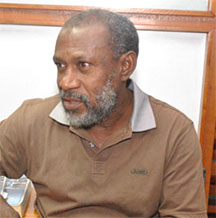Clarence Ceres is of the view that the high profile which Guyana once enjoyed in the field of furniture-making is being continually compromised by what he regards as the “crisis” in the wider forestry and wood products sector. If the once highly-vaunted craft of joinery is to be restored to its former pedestal, he says, there is need for urgent and wide-ranging state and private sector intervention.
Ceres told Stabroek Business that much of the decline in the wood products sector has to do with deficiencies in the management of the forestry sector, particularly, the seeming indifference to the need to create an enabling environment in which trades connected to value-added timber can prosper.
As is the case with other producers in the wood products industry with whom this newspaper has spoken, Ceres believes that the continued proliferation of log exports is doing more than crippling the value-added sector. It is, he says, killing off other industries and having a deleterious effect on the economy as a whole. “Reputations in the joinery and other sectors are being ruined on account of the poor quality of the raw material with which some joiners must work,” Ceres said.

When Ceres travels to Barbados as part of a 25-member contingent from Guyana to attend the May 22 – 25 Barbados Manufacturers Expo (BMEX) he will be hoping that his sample furniture products find favour with a market which he says offers decidedly higher prices than those offered locally. His worry, he says, is that if Guyana is to return to the position of respect and recognition which the local furniture industry once enjoyed there simply must be radical changes in the administration of the forestry sector designed specifically to ensure that there is a far greater focus on adding value to our timber.
The decline, he believes, now threatens to cripple the industry. In circumstances where joiners have found it difficult to get hold of high-quality timber at affordable prices they have resorted to widespread use of a “substitute’ which he calls MDF. Ceres says that MDF is essentially “compressed cardboard” and that the end product is notorious for the swiftness with which it dismantles.

“The problem is that we have been reduced to a position where, in the absence of high-quality wood that is affordable some furniture-makers are resorting to cheaper substitutes and those are obviously less durable. Customers have come to mistrust the industry,” Ceres says.
It is a trend which disturbs him. He comes from a family of joiners. His father, Charles and two brothers have been part of the trade. His own 30 years as a joiner have been divided between Guyana and Suriname. It was in Suriname, he says, that he partially learnt the trade.
Both his home and his workshop are at Parfait Harmonie and the considerable decline in demand for wooden furniture has meant that he has had to hold on to a modest amount of stock on his premises. He considers the five dining sets which he currently has in storage as “bargains” at prices that range between $125,000 and $275,000.
Ceres believes that saving the furniture sector – and a few other sectors as well – can only be accomplished by a collective effort spearheaded by the authorities to ensure that “we get more value out of our timber.”
What Ceres says he favors is a menu of measures that includes rules that place strictly monitored limits on log exports and quality-controlled production of value-added timber for the local forestry products markets. Part of the focus, he says, has to be on both public and private sector investment in equipment to increase both the rate at which logs are processed and the volumes of processed timber.
This is not the first time that Ceres has sought to sell furniture in Barbados. In the past he has also targeted the Trinidad and Tobago market. He is upbeat about the forthcoming Barbados market. According to Ceres, apart from the fact that furniture prices in Barbados are “much better” than prices locally he is hoping that his investment in the event will bring him a sustained market though he concedes that his fortunes and the fortunes of others in his trade can only be assured if the country places a far higher value on the forestry sector than it appears to do at this time.




